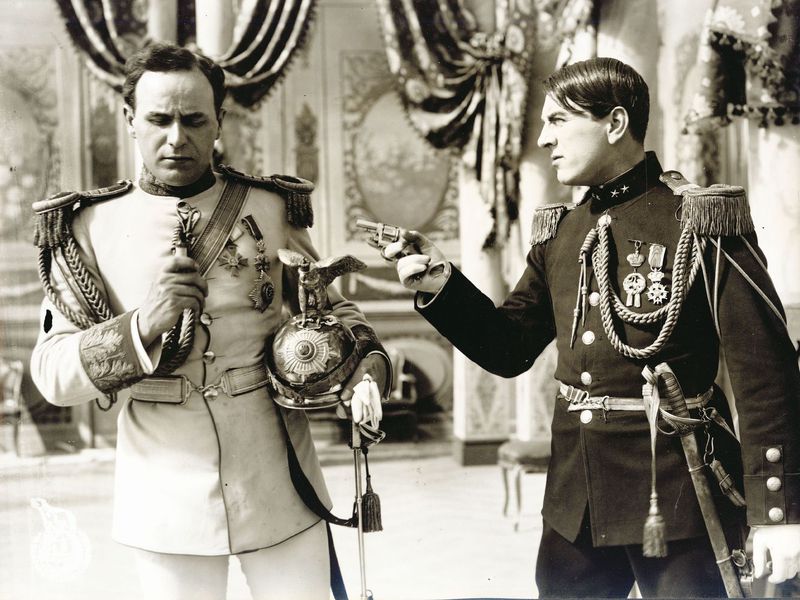DEN SORTE KANSLER (Il cancelliere nero / The Black Chancellor) (DK 1912)
Directed by August Blom
The dastardly Chancellor von Rallenstein, tyrannical regent of his country, plots the marriage of Princess Irene to the nephew of Grand Duke Zoba of a neighbouring state, but the resourceful Princess has already given her heart to Lieutenant Pawlow. Irene’s loyal lady-in-waiting Countess Feodora and her brave paramour Lieutenant Groblewsky are enlisted to outwit the Chancellor and his henchman Count Rockowitz, who has designs on Feodora. When Rallenstein learns that Irene and Pawlow were secretly married, he determines to have all the witnesses murdered.
Den sorte Kansler offers the momentum and excitement of a 1910s serial in just under one hour, packing in all the intrigue, romance, and adventure audiences expected in Ruritanian tales. Britain’s Bioscope reviewer (18.07.1912) was gushing in his praise: “This is a military melodrama of the very best sort, one of those stories which set out to be sensational, and which gradually work up a crescendo of intensity into a perfectly tremendous climax.” The film includes numerous plot elements typical of mythical Balkan kingdom narratives, including dynastic alliances, a despotic non-royal regent, an imprisoned princess, a daring rescue from the depths of a castle, and, of course, lots of fancy uniforms. The Copenhagen newspaper Folkets Avis (11.06.1912) called it “quite brilliantly made. The two creators, [August] Blom and [Christian] Schrøder … can easily compete with any foreign film company.”
The film was an international success, becoming something of a touchstone in its own right. Critics were quick to compare it with Anthony Hope, such as Moving Picture World’s Louis Reeves Harrison (21.09.1912): “This is one of a large and interesting class of plays of the ‘Prisoner of Zenda’ type, whose charm resides in its ingenious and entertaining improbability, the author not despising truth but making it subsidiary to delightfulness… The scene is that of one of those imaginary sovereignties which are supposed to exist in or near the Carpathian mountains and invariably have for nominal ruler a lovely Princess, but are actually dominated by a military despot in the person of a Chancellor.” While costumes do have a certain imaginative Balkan flair, exteriors, including shots of Kronborg Castle (Shakespeare’s Elsinore), are unmistakably Danish.
There are, however, significant differences between Den sorte Kansler and the Anglo-American Ruritania school, most crucially the absence of a British or American rescuer. This was not the case with the source material, and the film’s fascinating genesis has not hitherto been recounted. The source material is Sir William Magnay’s 1901 novel The Red Chancellor, a scrappily written adventure-romance with risible dialogue, in which an upper-class Englishman travels “in east central Europe” to escape the malaise of the rich and idle. There he gets involved with various court intrigues, pitting him against the wicked Chancellor, Count von Rallenstein (“ugly almost to repulsiveness”) and his foppish henchmen. The novel pushes the idea that the locals are either helpless or conniving, requiring a proper Englishman to clear up all the nonsense. It also contains undercurrents of anti-Semitism and a fear of unmanliness.
The novel was soon translated into multiple languages, but perhaps nowhere as quickly as in Denmark, where it was publicized in October of the same year (Horsens Social-Demokrat, 08.10.1901). Curiously it first appeared in serialized form in April 1902 in the women’s journal the Damernes Blad, prompting the women’s columnist of the Jyllandsposten (29.04.1902) to remark, “you have to look hard to find anything so – bloodthirsty!” In 1905 the actor-director Holger Rasmussen announced he was adapting the novel into a play, called Den sorte Panter (“The Black Panther”; in the novel, the Chancellor’s nickname is “the Jaguar”), which appears to have been briefly staged at Rasmussen’s Kasino theatre in 1906 but then revived on a grander scale in April 1912. Rasmussen made a number of plot changes, including making the hero an American rather than an Englishman, and set the last scene on the Bay of Naples.
Now the timeline gets fuzzy. It seems that Rasmussen discovered his “good friend” Christian Schrøder had secretly adapted the novel for Nordisk, creating great resentment (København, 13.06.1912). In turn, Rasmussen and his colleague Einar Zangenberg got the Kinografen production company to film their original version, using the cast from the Kasino theatre and keeping the title Den sorte Panter (sometimes called Kansleren kaldet “Den sorte Panter”). Newspaper advertisements in June and July ran notices next to each other, creating enough confusion that the Horsens Avis (01.07.1912) felt it necessary to explain that they were two different films from the same source material, though Schrøder and Rasmussen took great, albeit divergent, liberties with the novel. Nordisk’s film unquestionably had the greater distribution, and in 1914 the company turned another of Sir William Magnay’s overwrought Ruritanian romances into a feature, Count Zarka (1914).
Amy Sargeant, Jay Weissberg

DEN SORTE KANSLER (Il cancelliere nero / The Black Chancellor) (DK 1912)
regia/dir: August Blom.
scen: Christian Schrøder, dal romanzo di/based on the novel by Sir William Magnay, The Red Chancellor (1901).
photog: Johan Ankerstjerne.
cast: Thorkild Roose (il cancelliere nero/the Black Chancellor, Count von Rallenstein), Poul Reumert (conte/Count Rockowitz), Ebba Thomsen (principessa/Princess Irene), V. [Valdemar] Psilander (tenente/Lieutenant Pawlow), Robert Dinesen (Lieutenant Groblewsky), Jenny Roelsgaard (dama di compagnia/Countess Feodora, lady-in-waiting), Frederik Jacobsen (granduca/Grand Duke Zoba) Christian Schrøder (venditore ambulante/a peddler).
prod: Nordisk Films Kompagni.
uscita/rel: 10.06.1912, Panoptikon, København.
copia/copy: DCP, 48′ (4K, da/from 35mm, orig. l: 915 m.); did./titles: DAN, subt. ENG.
fonte/source: Det Danske Filminstitut, København.


 Italiano
Italiano